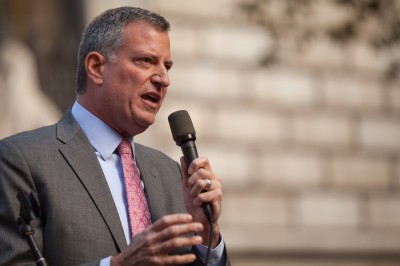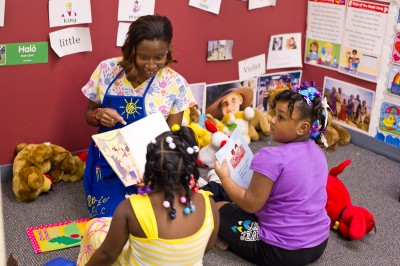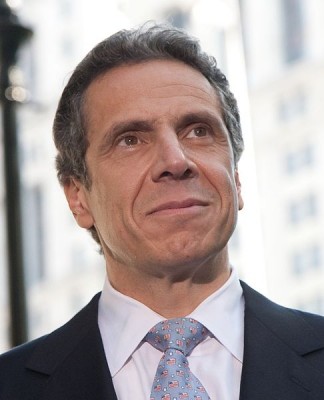A quick glance at New York headlines this week reveals a somewhat ironic fight about pre-kindergarten, a topic of huge importance to educators and families that under normal circumstances gets little press coverage.
But take distinct and dueling plans from two powerful New York Democrats — the city’s liberal, let’s-tax-the-wealthy Mayor Bill de Blasio vs. a more centrist but not to be outdone Governor Andrew Cuomo — and you can guarantee macho posturing and headlines to match. Most of it is over which politician has the better or more promising plan, instead of the merits of high-quality early childhood education.
The front page of Wednesday’s New York Daily News shows New York City Mayor Bill de Blasio in full cowboy gear, with the headline: “Duel at pre-k corral.’’ “The Duel for Pre-kindergarten Goes Public,’’ proclaimed New York Magazine. Pre-k is also the lead story in the New York Times, with a headline noting that the new plan Cuomo unveiled in his budget address Tuesday includes $1.5 billion over five years for a statewide program.
The different plans have consequences that “could reach far beyond the issue of childhood education,’’ the Times notes. It’s easy to forget that funding high quality pre-k is really about what should be best for children, not politicians. And yet here are two Democrats agreeing on the need for early childhood education – an issue that has divided state after state.
The irony is not lost on W. Steve Barnett, director of the National Institute for Early Education Research at Rutgers University in New Jersey, or NIEER.
“It is heartening to see two such high-profile elected leaders competing over who has the “best“ pre-K plan,’’ Barnett noted. “As an economist, I see competition as a good thing…It is easy to see these proposals as an either/or proposition, but the best route for New York’s educational and economic prosperity is both.’’
Even at a time when President Barack Obama is pushing national pre-k expansion and calling it “good bang for the buck,’’ financial hardships have left many states without enough advocates in either party who will push hard for sufficient pre-k funding.
In recent years, NIEER found that funding for state pre-K programs plummeted by more than $700 per child nationwide, even as enrollment grew. In some states, the fight gets pretty ugly.
In Mississippi, until recently the only state in the south without publicly funded pre-kindergarten, one can still hear echoes of 1950s America in the debate: those who argue against it insist that churches and families can do a better job of educating children than professionals.
No matter who pays for the program, any debate over pre-k eventually will turn to quality. A well-equipped and well-run pre-school should be run by trained teachers, in clean, well-equipped classrooms displaying examples of children’s work with their names on it at their eye level. There should be plenty of books, blocks, toys, and supplies and well-organized stations with lots of letters, numbers and other learning materials. Everything should be labeled and easy for kids to reach – and that’s just a start.
Over the years of covering pre-kindergarten, I’ve seen a handful of high-quality programs, but many others that truly are little more than babysitting, something Cuomo expressed concern about in his speech this week. (Not all babysitting, of course, is created equal: but I visited a pre-k once where the littlest learners sat watching the evening news with inattentive grown-ups)
No matter who ends up paying for universal pre-k program in New York, it seems that both Cuomo and de Blasio have a lot of work ahead. There hasn’t been enough room or enough money or enough support for such programs in years. Apparently, they can also learn a lot from state-funded programs in neighboring New Jersey.
The Garden State offers some real lessons, according to a Slate article by Sara Mead, a principal at the non-profit Bellwether Partners.
“…The reality is that de Blasio and his critics need only look across the river to see evidence of the tremendous potential of universal pre-K—and the challenges involved in realizing that potential,’’ Mead wrote, citing research that shows “large, significant impacts on children’s language, literacy, and math skills at kindergarten entry.”
As the two New York politicians tout the merits of their differing plans, there appears to be plenty of enthusiasm for both plans, and it will be interesting to see if the fight can move away from their own agendas.
“It is our sincere hope that Cuomo and de Blasio can work together on both state- and city-level initiatives to create a quality, stable program and ensure that all of New York’s children are off to the bright start they deserve,’’ said Barnett of NIEER.






